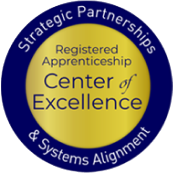Apprenticeship is employer-driven. It is a customizable, structured, and highly-scalable strategy to build a stronger and more loyal workforce. Learn more including why 97% of employers with registered apprenticeship programs recommend the model to others...

| Body | Resource Date | Resource Link |
|---|---|---|
Since 2016, the U.S. Department of Labor (DOL) has significantly increased its investment in Registered Apprenticeship (RA) as a proven strategy for building a skilled workforce and expanding economic opportunity. A key component of the federal investment in scaling RA adoption nationwide has been implementation of apprenticeship expansion grants to state agencies. This report explores how states have implemented these grants, implementation challenges, and promising practices they have utilized to meet RA expansion objectives. Drawing on RA grant program data, interviews with state RA expansion grant recipients, and state-level documentation, the report highlights key lessons that can inform future efforts to fund RA program expansion and new Registered Apprentice growth. By examining both common themes and innovative approaches, this report offers practical insights for policymakers, practitioners, and stakeholders working to advance apprenticeship opportunities and outcomes nationwide. |
https://dolcoe.safalapps.com/sites/default/files/2025-10/State%20Grant%20Progra… | |
Regional economies increasingly compete on their ability to develop and retain skilled talent in key industry sectors. With an aging and shrinking workforce, and rapidly developing technology impacting workforce development across the board, traditional approaches may increasingly fail to align with employer needs, resulting in skills gaps that limit business expansion and reduce competitiveness. State and local economies will increasingly be forced to develop and quickly scale more innovative approaches to supporting current and prospective employers’ talent strategies. This guide outlines how Registered Apprenticeship (RA) programs serve as a powerful tool within sector strategies to build sustainable talent pipelines and meet industry-specific workforce needs. |
https://dolcoe.safalapps.com/sites/default/files/2025-09/RA%20and%20Sector%20St… | |
Each year, nearly 200,000 service members transition from military to civilian life. These veterans are ideal candidates for RA programs. These programs offer a structured, earn-while-you-learn approach that closely mirrors the training models many veterans experienced in the military. With the promise of paid, hands-on training and a clear path to long-term employment, RA programs provide the stability, skill development, and career advancement opportunities many veterans seek. This tip sheet highlights effective strategies for recruiting veterans into RA programs, helping sponsors and/or employers connect with this highly skilled and disciplined talent pool while supporting veterans in building meaningful, long-term civilian careers. |
https://dolcoe.safalapps.com/sites/default/files/2025-09/Bridging%20the%20Gap%2… | |
As a Business Service Representative (BSR) your goal is to engage local employers in developing sustainable solutions for their workforce development. Registered Apprenticeship (RA) is the most time-tested, proven method for employers to recruit, train, upskill and retain their workforce. Apprenticeship Accelerators are an ideal format to engage and educate employers in your community about RA as a tool for their human capital strategy. This toolkit is designed to help you think through important details when planning your event to ensure an ideal experience for your targeted employers. Based on best practices and extensive experience, this resource includes key considerations on the “who, what, when, where, and how” for coordinating your event. Also included is an Event Planning Template to help guide your planning and communicate decisions across your Accelerator team. |
https://dolcoe.safalapps.com/sites/default/files/2025-09/Apprenticeship%20Accel… | |
Workforce development professionals who work with youth and young adults provide essential services, supports, and connections for career exploration and development. RA is another powerful option for in-school youth (ISY) and out-of-school youth (OSY) enrolled in Workforce Innovation and Opportunity Act (WIOA) Youth programming across the U.S. Opportunities through RA, including youth apprenticeship and pre-apprenticeship, open doors to help young people prepare for high-demand careers through a tried and true earn-and-learn model. This guide offers Case Managers who work in American Job Centers (AJCs) information on apprenticeship opportunities that align with WIOA Youth program elements and lead to positive outcomes during and after program exit. |
https://dolcoe.safalapps.com/sites/default/files/2025-09/Bridging%20the%20Gap_T… | |
Educating Economic Development Organizations (EDOs) on Registered Apprenticeship (RA) basics ensures that they can accurately represent and promote apprenticeships as a core workforce strategy. This knowledge empowers them to integrate RA into their economic development efforts, unlock new opportunities for business growth, and strengthen their region’s position in a competitive economy. This guide helps State Apprenticeship Agencies (SAAs) and Office of Apprenticeship (OA) staff effectively support EDOs in leveraging RA as a strategic workforce and economic development tool. |
https://dolcoe.safalapps.com/sites/default/files/2025-09/State%20RA%20and%20EDO… | |
Registered Apprenticeship (RA) is a proven workforce strategy that combines paid work experience with structured learning. Employers build a skilled workforce, and participants earn as they gain experience, often leading to permanent employment and career advancement. The Workforce Innovation and Opportunity Act (WIOA) is the nation’s primary workforce development legislation, designed to help job seekers access employment, education, training, and support services, while also assisting employers in finding skilled workers. It promotes coordination among federal, state, and local workforce programs to create a more efficient and effective service delivery system. Workforce boards and WIOA staff can support RA expansion by leveraging On-the-Job Training (OJT) funds. This tip sheet provides best practice for workforce boards on how to use WIOA OJT funds to support RA. |
https://dolcoe.safalapps.com/sites/default/files/2025-09/Using%20WIOA%20OJT%20F… | |
The guide equips One-Stop Operators (OSOs) with a clear framework for integrating Registered Apprenticeship (RA) into WIOA services by defining core OSO responsibilities, outlining strategic steps to boost WIOA/RA co-enrollment, and providing sample metrics and resources. The guide covers how to embed apprenticeship discussions into regular agendas, build interagency apprenticeship teams, standardize workflows, leverage data, and target population-focused practices to drive apprenticeship results. |
https://dolcoe.safalapps.com/sites/default/files/2025-09/OSO%20Guide%20to%20Imp… | |
Access to an adequate pool of skilled labor is the most critical site-selection factor for firms looking to either launch new operations or relocate. Firms want readily available, skilled talent to sustain operations and growth. Successful firms rely heavily on demographic and occupational data, workforce analytics, and local training infrastructure in site feasibility models. Offering existing firms as well as potential new businesses a network and model of robust RA programming should be considered a key factor for Economic Development Organizations’ (EDOs) work to support local and regional workforce sustainability. Incorporating RA into economic development strategies can help EDOs attract and retain businesses, enhance local workforce readiness, and promote regional prosperity and growth. This guide will explore the strategic value of RA for EDOs, the current policy environment that supports this alignment, and the collaborative roles of state RA staff and the public workforce system. |
https://dolcoe.safalapps.com/sites/default/files/2025-09/RAs%20and%20EDOs%20Gui… | |
Business Services Representatives (BSRs) play a vital role in helping local employers with talent pipeline development. Employers need more than just a job order posting or a resume referral; they need a longer-term solution to recruit, train, retain, and upskill staff. BSRs can help employers by engaging them not only in WIOA Core and Partner Program services, but also by introducing them to Registered Apprenticeship (RA). This guide provides BSRs with strategies to effectively engage employers and American Jobs Center (AJC) staff to increase co-enrollment of customers in WIOA Title I—Adult, Dislocated Worker, or Youth—and RA. |
https://dolcoe.safalapps.com/sites/default/files/2025-09/Business%20Services%20… |
